
Black History Month 2024: There’s nothing ‘hidden’ about it — JPMorgan Chase event showcases incredible recoveries by Medgar Evers College, Rutgers University
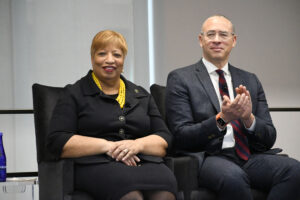
On the fifth floor of the expansive JPMorgan Chase MetroTech complex in Brooklyn, it’s easy to be distracted by the beauty of the space – it’s downright immaculate.
But for nearly an hour on February 12 at the “Achieving Excellence: Partnering for Impact” Black History Month event hosted by the financial powerhouse, the ambiance took a back seat to a pair of stars in attendance – both of whom held an audience of hundreds in Room 514 completely captive with their stories of being first.
In one chair sat the first female president in the history of Medgar Evers College, also the first scientist to earn the role.
To her left sat the first Black dean in the history of Yale University and currently the first Black president in the storied history of Rutgers University.
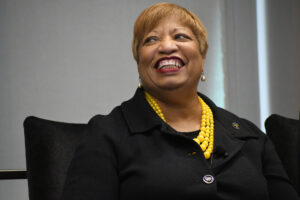
Dr. Patricia Ramsey and Dr. Jonathan Holloway paved their own paths – and are now charged with doing the same for thousands of bright minds of all backgrounds throughout the New York-New Jersey area.
Having both started their administrations amid the COVID-19 pandemic, their obstacles have been quite similar – with Medgar Evers College and Rutgers University both facing significant financial deficits.
And both are well on their way, if not at the doorstep, of eclipsing those fiscal hurdles.
That has taken innovation, strategic partnerships and sticktoitiveness to overcome.
Their agility in the face of adversity is what they both believe will be a significant part of their legacies.
“I would like to leave a viable institution that is no longer considered a ‘hidden gem.’ When I first came I kept hearing that Medgar Evers is a ‘hidden gem,’” said Dr. Ramsey.
“I said, ‘Well, we don’t want to be hidden.’ As a legacy, I would love to be able to leave an institution that is well known and recognized for the important work that it does. Because we will have graduates who are going into various roles, not only in the state, but in the nation, where people will truly know who Medgar Evers the man is and who will know about Medgar Evers College.”
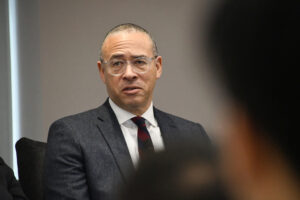
Dr. Holloway says that it’s his goal that Rutgers becomes more service-oriented.
“I’m really focused on Rutgers becoming known for being a public university committed to service,” said Dr. Holloway. “Service can be expressed with military commitment of service. It can be service committed to doing something after work if you’re working a private sector job. It can be service in elected office.
“We want to make sure that we graduate young people to understand that giving something to a community is the best way to protect the community, and to ensure that it’s going to be a healthier place going forward.”
The commonalities in their approaches were obvious, both focused on the student experience first and foremost.
Dr. Ramsey spoke about helping the community beyond the school recover – after all, Medgar Evers College is quite literally built into the fabric of Central Brooklyn.
As a result, and borne out of the pandemic, internships paid for by the university were introduced as part of the Brooklyn Recovery Corps program. Local businesses are matched with students to help infuse the talent on campus into a community thirsty for innovation. To date, there are more than 80 businesses, including non-profits, that are participating in the program.
In addition, an internal support system at Medgar Evers College was formed called Cultivating Holistic Academic Mindsets to Promote Student Success (CHAMPSS). It is designed to provide first-year and new transfer students with earned associate degrees, comprehensive support services that include financial, social, and academic advisement to ensure successful matriculation experience at the college, leading to the completion of a baccalaureate degree. The program can pay up to full tuition, as well as items such as Metro cards and books.
“We fill gaps for students who need those gaps filled,” said Dr. Ramsey. “Because with our students, the median household income is less than $35,000. We are really, really pleased with the progress of the students.”
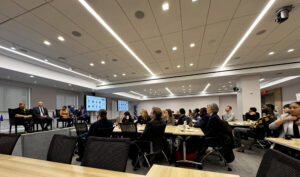
Immediately after his inauguration in 2021, Dr. Holloway saw a similar need for his middle-to-low income student body. With this background in American history and the concept of “preserving Democracy,” the internship program at Rutgers has focused on the non-profit sector and elected offices, with students now utilizing the summer with internships just blocks away from the Supreme Court in Washington, DC. Rutgers is also paying for these internships to bridge the gaps of opportunity for all.
Currently, the program has benefitted nearly 100 students – and it’s growing.
“It’s a start,” said Dr. Holloway. “It’s not actually that I had a pitch for this program, donors have come forward because they’re concerned as well.”
For Dr. Ramsey, BRC and CHAMPSS were products of a $20 million grant that she secured in the first few weeks on the job. She’s now focused on how she will maintain the momentum when the funds inevitably run out, and knows that she will need the help of additional partners.
“As with anything, things change; the environment changes,” said Dr. Ramsey. “And so we’re now looking to get some private partners to help continue the programs – so that we can continue to help uplift the community.”
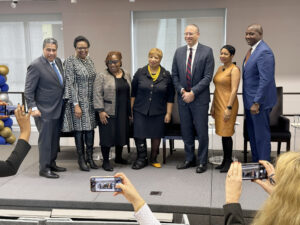
The hosts of the event, JPMorgan Chase, have worked with campuses all over the country, partnering in order to fulfill its mission of making “dreams possible for everyone, everywhere, every day.”
And in lockstep with the efforts of Dr. Ramsey and Dr. Holloway, JPMorgan Chase wants to aid businesses everywhere.
“We have a $30 billion commitment to close the racial wealth gap to support brown and black owned businesses,” said Alex Picou, the afternoon’s keynote speaker.
And JPMorgan Chase and its partners at the event, including Advancing Black Pathways, Adelante Tri-State, Black Executive Forum and the Brooklyn Corporate Center, all know that a primary impact point is working with students of all backgrounds.
“We know that the talent is there,” said Mya Pollard of Advancing Black Pathways. “You cultivate something in our students to help them see themselves. And then we look at opportunities of how we can create the platform and opportunity for them to come into our firm in our organizations to continue on that momentum.”
But as event panelist Mark Elliott said, it all starts with a belief that is established on campuses.
“We uplift folks who maybe had a different start. We do that through that experience to have on campus,” said Elliott, who represents JPMorgan Chase’s Military and Veteran Affairs division. “We have over almost a million and a half veterans showing up on campuses around the country. If we can reach them at that point, and we can show them that there’s an opportunity in an organization like JPMorgan Chase, then I think we’re starting to have an impact.”
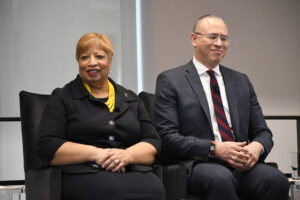
Dr. Ramsey concurred that progress is being made while also providing a science lesson for the room, pointing to cumulatively overcoming obstacles – albeit fiscal or political – and embracing uniqueness.
“Look at plants, they grow in tropical areas naturally, you will never see all plants that are the same. And there is a reason for that, that nature did that because it’s all about survival of the fittest,” said Dr. Ramsey.
“And so if you have any kind of pathogen that comes in and the plants are all the same, that species gets attacked and it wipes out that species. And so we should think about how, as people, if we look at nature, then we really take some lessons from that. It’s always better if you have that diversity because it brings diversity and diverse ideas and opportunities.”